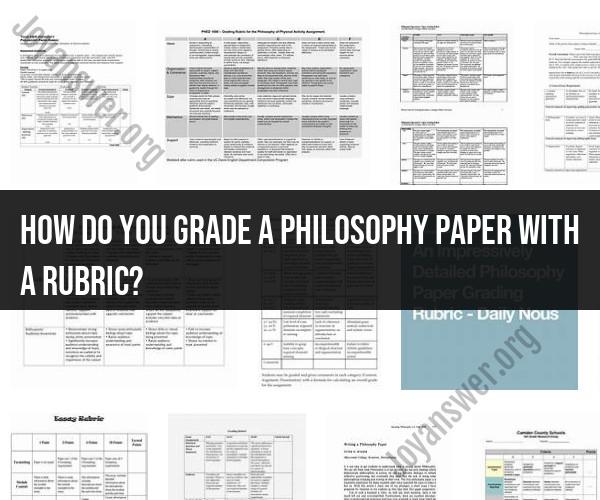How do you grade a philosophy paper with a rubric?
Grading philosophy papers with a rubric involves evaluating the paper based on specific criteria and assigning scores or grades accordingly. The use of a rubric helps ensure consistency and transparency in the grading process. Here's a step-by-step guide on how to grade a philosophy paper using a rubric:
1. Review the Rubric:
- Familiarize yourself with the rubric you will be using. The rubric should outline the specific criteria and performance levels (e.g., excellent, good, fair, poor) for each criterion.
2. Read the Paper:
- Carefully read the philosophy paper from start to finish. Take notes as you read to identify strengths and weaknesses in the paper's argument, structure, and writing.
3. Evaluate the Introduction:
- Start by assessing the introduction. Does it provide a clear thesis statement and an overview of the paper's main arguments and goals? Use the rubric to determine the level of clarity and effectiveness in the introduction.
4. Evaluate the Argument:
- Focus on the paper's argumentation. Consider the logical structure of the argument, the use of evidence, and the soundness of reasoning. Assess whether the author effectively supports their thesis with relevant and persuasive points.
5. Evaluate Clarity and Organization:
- Assess the overall clarity and organization of the paper. Is the writing clear and easy to follow? Are ideas presented in a logical sequence? Evaluate how well the paper flows and transitions between sections.
6. Evaluate Writing Style and Grammar:
- Consider the quality of the writing itself. Assess the author's use of language, grammar, punctuation, and spelling. Evaluate the paper's overall readability and whether it adheres to academic writing conventions.
7. Evaluate Originality and Critical Thinking:
- Assess the paper's originality and the author's ability to engage in critical thinking. Does the author provide unique insights or perspectives on the topic? Evaluate their ability to critically evaluate and analyze philosophical concepts.
8. Provide Comments and Feedback:
- Alongside the rubric, provide specific comments and feedback throughout the paper. Highlight areas where the student excelled and areas that need improvement. Offer constructive suggestions for revisions.
9. Assign Scores:
- Use the rubric to assign scores or grades to each criterion. Be consistent in applying the rubric, and justify your scores with comments that reference specific examples from the paper.
10. Summarize Feedback:
- In a concluding section of your feedback, summarize your overall impressions of the paper. Offer encouragement and guidance for future improvements.
11. Discuss the Grading:
- If you are grading papers for a class, consider holding individual or group discussions with students to go over the grading and provide them with an opportunity to ask questions or seek clarification on your feedback.
12. Maintain Consistency:
- If multiple graders are evaluating philosophy papers, ensure that all graders are using the same rubric and adhering to consistent grading standards. This helps maintain fairness and objectivity.
Remember that grading philosophy papers, like any other academic work, requires careful attention to detail and a fair, constructive approach. The rubric should serve as a helpful tool for both assessing the paper and providing feedback that supports the student's learning and improvement.













